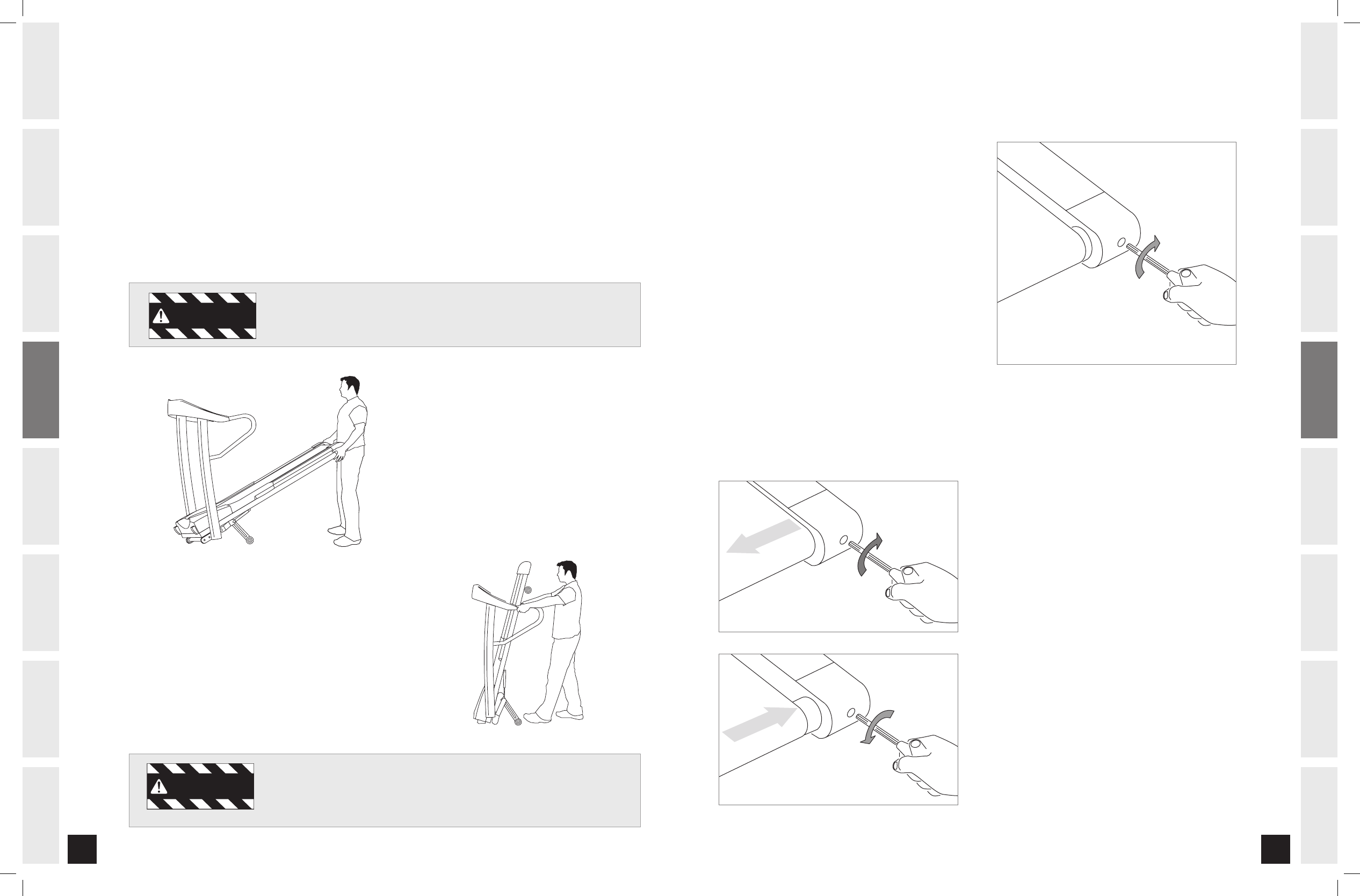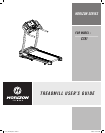
14
INTRODUCTION
IMPORTANT
PRECAUTIONS
ASSEMBLY
BEFORE
YOU BEGIN
TREADMILL
OPERATION
LIMITED
WARRANTY
TROUBLESHOOTING
& MAINTENANCE
CONDITIONING
GUIDELINES
15
INTRODUCTION
IMPORTANT
PRECAUTIONS
ASSEMBLY
BEFORE
YOU BEGIN
TREADMILL
OPERATION
CONDITIONING
GUIDELINES
TROUBLESHOOTING
& MAINTENANCE
LIMITED
WARRANTY
CENTERING THE RUNNING BELT
The running belt has been properly adjusted at the
factory before it was shipped. At times the belt can
move off-center during shipment. Before operating the
treadmill, make sure the belt is centered and remains
centered to maintain smooth operation.
CAUTION:
belt at all times.
If the running belt is too far to the right side:
With the treadmill running at 1/2 mph, turn the right
adjustment bolt clockwise 1/4 at a time (using
the supplied Allen wrench). Check the belt alignment.
Allow belt to run a full cycle to gauge if more adjustment
is needed. Repeat if necessary, until the belt remains
centered during use.
If the running belt is too far to the left side:
With the treadmill running at 1/2 mph, turn the right
adjustment bolt counter-clockwise 1/4 at a time
(using the supplied Allen wrench). Check the belt
alignment. Allow belt to run a full cycle to gauge if more
adjustment is needed. Repeat if necessary, until the
belt remains centered during use.
Belt is too far to the right side
Belt is too far to the left side
TENSIONING THE RUNNING BELT
The running belt has been properly adjusted at the
factory before it was shipped. At times the belt can
move off-center during shipment.
CAUTION: Running belt should NOT be moving during
tensioning. Over-tightening the running belt can
cause excessive wear on the treadmill as well as its
components. Never over-tighten the belt.
If you can feel a slipping sensation when running on the
treadmill, the running belt must be tightened. In most
cases, the belt has stretched from use, causing the
belt to slip. This is a normal and common adjustment.
To eliminate this slipping, TURN THE TREADMILL OFF
and tension BOTH THE REAR ROLLER BOLTS using the
right as shown. Turn the treadmill on and check for
roller bolts more than 1/4 turn at a time. Belt is properly
tensioned when the slipping sensation is gone.
PROPER USAGE
Your treadmill is capable of reaching high speeds. Always start off using a slower speed and adjust the speed in
small increments to reach a higher speed level. Never leave the treadmill unattended while it is running. When
not in use, remove the safety key, turn the on/off switch to off and unplug the power cord. Make sure to follow
attempt to turn around or look backwards while the treadmill is running. Stop your workout immediately if you
feel pain, faint, dizzy or are short of breath.
Do not operate the treadmill if the power cord or plug is damaged.
If the treadmill appears to not be working properly, do not use the treadmill.
FOLDING
Firmly grasp the back end of the treadmill. Carefully
lift the end of the treadmill deck into the upright
position until the foot lock latch engages and
securely locks the deck into position. Make sure the
deck is securely latched before letting go. To unfold,
firmly grasp the back end of the treadmill. Gently
press down on the foot lock latch with your foot until
the lock latch disengages. Carefully lower the deck
to the ground.
MOVING
Your treadmill has a pair of transport wheels
built into the frame. To move, make sure the
treadmill is folded and securely latched. Then firmly
grasp the handlebars, tilt the treadmill back and
roll. NOTE: Do not attempt to disassemble and
transport treadmill.
Our Treadmills are heavy, use care and additional help if necessary when moving.
position with the lock latch secured. Failure to follow these instructions could
result in injury.
WARNING
WARNING
CT81_Treadmill_Rev.1.8.indd 14-15 5/29/07 8:51:42 AM


















